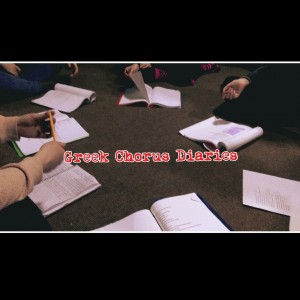I directed the recent production of Medea and asked Natalie J Romero, co-ordinator of the Greek Chorus Diaries if she would allow me to add my thoughts on the Greek Chorus. She agreed so here they are –
I began reading around the subject of Greek theatre (and all extant plays) 18 months ago. It quickly became clear to me that in the Chorus Greek theatre presented an immensely powerful method of connecting actors to audience. Springing out of religious and social kinship groups in pre-capitalist and matrilineal societies, they represented the power of human beings working in cohesion.
The chorus is utilised by the three big names of Greek Theatre; Aeschylus, Euripides and Sophocles (though I feel that Sophocles viewed it as something of an encumbrance that couldn’t be done away with due to convention). It is always significant commenting and at times colluding in the action, giving moral judgement (or misjudgement) on the characters as they deal with their dilemas.
The more I read and embroiled myself in the subject the more aghast I became as to how such a magnificent element to theatre has been almost entirely lost and forgotten. An interesting comment I saw on a theatre forum following our show at the Unity Theatre stated how much the person had loved our Greek Chorus and how she had never seen it before and wanted to see more of it!
In thinking about the whys and the wherefores it seems obvious to me that as theatre became the preserve of the bourgeoisie who if it is not too much of an oxymoron to say are and remain always a group of individualists that the culture and vision of society that their writers would promote from Elizabethan times onwards would be one that didn’t need the crowd, the masses, the ‘ordinary’ people so beloved of Euripides. It is instructive to look at Shakespeare’s comedies and see the peasantry shown as oafish, cunning, stupid, incapable of sophisticated thought see ‘A Midsummer Night’s Dream’.
And so it goes on into modern theatre with the vogue for absurdist and individualist representations of reality disassociated from any meaningful political and social context. And theatre is always a social medium in a way that TV cannot be other than indirectly.
As we ran workshops on Greek theatre in the Autumn of last year we quickly became enamoured with the Chorus seeing its power and its magic released. It was also interesting that a fair few of the actresses who auditioned for parts in Medea initially for main characters quickly decided that their preference was to be in the Chorus.
And so to our Greek Chorus- well the first thing to say is I’m immensely proud of them all. Mairi Kennedy, Maria Hutchison, Natalie Romero, Vicky Lodge, Helen Shrimpton, Bex Culshaw, Faye Caddick and Sam Walton. We were blessed at the auditions by so many intelligent and sound actresses turning up as the work of the Chorus it’s synchronisation, working together on movement and sound is no easy matter. I was ably assisted in directing the Chorus by Faye Caddick who had a far better memory than me and saved the day on a few occasions and also Sam Walton as the Chorus Leader drove everybody on and ratcheted up the intensity. The eight chorus members all seemed to get along well and kept egos to a minimum and after a while I left them to work things out for themselves. They came up with a fair few of the choral pieces without any influence from me including the most dynamic entry to a play you could wish for ‘the tree of life’ – startlingly dramatic with Sam leading from the front as always.
We played around with the lines moving them around the chorus, breaking them up, repeating them, doing call and responses which again largely worked.
So at the end of this process I am happy to have created a template, trialed it successfully. Is the chorus relevant to 21st century theatre – 100% yes and anyone who disdains such a view or is too lazy to deal with the demands of the chorus doesn’t deserve much artistic respect. I hope it informs future work that I undertake, I see no reason to merely slavishly ape the conventions of Greek Theatre created millennia ago – rather I contemplated a dialectic between the chorus and individual characters who at times would be in the chorus and at other times would come out and speak as individual characters before returning undistinguishable back in to the chorus so on and so forth.
So from the most politically and socially progressive theatre (unsurprising given that the Athenians had moved already into a (partial) direct participatory form of governance as opposed to the fraudulent representative democracy that we’ve been ‘gifted’ with) of any period we have a tremendous asset, one that should be taken out of the box in the attic, dusted down and put to work. The returns it will bring are most valuable!
